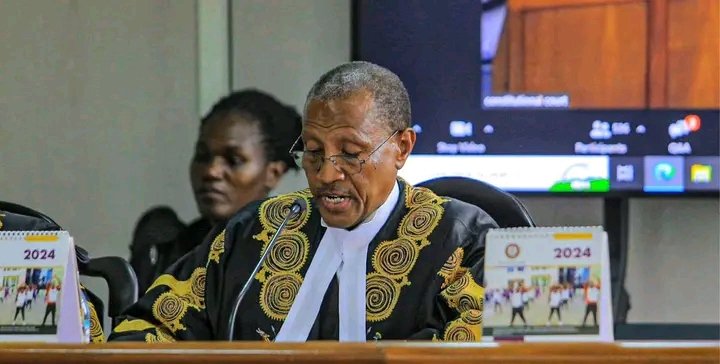In a much-anticipated ruling, the Constitutional Court has decided to uphold the Anti-Homosexuality Act 2023, which includes provisions for the death penalty for aggravated homosexuality. The decision was delivered by Deputy Chief Justice Richard Buteera, with the justices unanimously agreeing not to nullify the law or grant a permanent injunction against its enforcement.
The case stemmed from a consolidated petition filed by 22 individuals and organizations, including Fox Odoi, Andrew Mwenda, and Prof. Sylvia Tamale, challenging various aspects of the law. The petitioners raised concerns about the law's constitutionality, including whether it imposes a charge on the consolidated fund and whether adequate public consultations were conducted during its enactment.
Justice Buteera clarified that the conduct of the Speaker of Parliament during the enactment of the law did not contravene any laws. The justices found that the Anti-Homosexuality Act is consistent with principles of law, the right to equality, freedom from discrimination, and the right to human dignity and protection from inhuman treatment.
However, the court did partially agree with the petitioners on certain points, ruling that the law contravenes the right to privacy and the right to access health services. They expressed concerns that certain sections of the law could hinder progress made in the fight against HIV/AIDS.
The respondents have welcomed the decision of the court, although with some concerns about the sections that were struck out. They are considering appealing to the Supreme Court. Meanwhile, the petitioners are resolute about appealing the judgment, arguing that the justices aimed to appease the population rather than uphold justice.
This decision marks a significant departure from a similar law passed in 2014, which was nullified due to being passed without the required quorum in parliament. It also comes at a time when the West, particularly the US, has taken drastic measures, such as terminating trade deals and halting new loans to Uganda, in response to human rights concerns.

In a much-anticipated ruling, the Constitutional Court has decided to uphold the Anti-Homosexuality Act 2023, which includes provisions for the death penalty for aggravated homosexuality. The decision was delivered by Deputy Chief Justice Richard Buteera, with the justices unanimously agreeing not to nullify the law or grant a permanent injunction against its enforcement.
The case stemmed from a consolidated petition filed by 22 individuals and organizations, including Fox Odoi, Andrew Mwenda, and Prof. Sylvia Tamale, challenging various aspects of the law. The petitioners raised concerns about the law's constitutionality, including whether it imposes a charge on the consolidated fund and whether adequate public consultations were conducted during its enactment.
Justice Buteera clarified that the conduct of the Speaker of Parliament during the enactment of the law did not contravene any laws. The justices found that the Anti-Homosexuality Act is consistent with principles of law, the right to equality, freedom from discrimination, and the right to human dignity and protection from inhuman treatment.
However, the court did partially agree with the petitioners on certain points, ruling that the law contravenes the right to privacy and the right to access health services. They expressed concerns that certain sections of the law could hinder progress made in the fight against HIV/AIDS.
The respondents have welcomed the decision of the court, although with some concerns about the sections that were struck out. They are considering appealing to the Supreme Court. Meanwhile, the petitioners are resolute about appealing the judgment, arguing that the justices aimed to appease the population rather than uphold justice.
This decision marks a significant departure from a similar law passed in 2014, which was nullified due to being passed without the required quorum in parliament. It also comes at a time when the West, particularly the US, has taken drastic measures, such as terminating trade deals and halting new loans to Uganda, in response to human rights concerns.